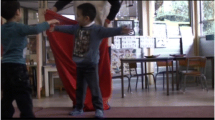Abstract
This case study examines parent–carer perceptions of music in storytelling sessions provided in a public library to children under the age of 5, including what music activities and ideas parent–carers implemented in the home as a result of the sessions. Data were collected from parent–carer focus groups, along with interviews with the storyteller and observations by the researcher. Following a description of the storytelling sessions four themes that emerged from the focus group data are discussed: (1) music in storytelling sessions enhanced social interaction for children; (2) music focuses the children in storytelling sessions; (3) music is embedded in storytelling; and (4) sessions provided new ideas for music in the home and beyond.
Similar content being viewed by others
References
Allison, D. T., & Watson, J. A. (1994). The significance of adult storybook reading styles on the development of young children’s emergent reading. Journal of Reading, 34(1), 57–72.
Arthur, L., & Makin, L. (2001). High quality early literacy programs. Australian Journal of Early Childhood, 26(2), 14–19.
Barclay, K. D. (1992). Linking lyrics and literacy through song picture books. Young Children, 41, 76–85.
Bogdan, R., & Biklen, S. (1998). Qualitative research for education. Boston: Allyn Bacon.
Custodero, L. A. (2006). Singing practices in 10 families with young children. Journal of Research in Music Education, 54(1), 37–56.
Custodero, L. A., Britto, P. R., & Brooks-Gunn, J. (2003). Musical lives: A collective portrait of American parents and their young children. Applied Developmental Psychology, 24, 553–572.
Custodero, L. A., Britto, P. R., & Xin, T. (2002). From Mozart to Motown, lullabies to love songs. Zero to Three, 23(1), 41–46.
DeJong, P. F., & Leseman, P. P. M. (2001). Lasting effects of home literacy on reading achievement in school. Journal of School Psychology, 39, 389–414.
Feierabend, J. (1990). Music in early childhood. Design for Arts in Education, 91(6), 15–20.
Fisher, D., McDonald, N., & Strickland, J. (2001). Early literacy development: A sound practice. General Music Today, 14(3), 15–20.
Gembris, H., & Davidson, J. (2002). Environmental influences. In R. Parncutt & G. McPherson (Eds.), The science and psychology of music performance (pp. 17–30). Oxford: Oxford University Press.
Hurwitz, I., Wolff, P., Bortnick, B., & Kokas, K. (1975). Nonmusical effects of the Kodaly music curriculum in primary grade children. Journal of Learning Disabilities, 8(3), 167–173.
Ilari, B. (2005). On musical parenting of young children: Musical beliefs and behaviors of mothers and infants. Early Childhood Development and Care, 175(7/8), 647–660.
Kemp, A. E. (1996) The musical temperament. Oxford: Oxford University Press.
Kenney, S. (1997). Music in the developmentally appropriate integrated curriculum. In C. Hart, D. Burts & R. Charlesworth (Eds.), Integrated curriculum and developmentally appropriate practice: Birth to age eight (pp. 103–144). Albany, NY: State University of New York Press.
Kitzinger, J. (1994). The methodology of focus groups: The importance of interactions between research participants. Sociology of Health and Illness, 16, 103–121.
Lamb, S., & Gregory, A. (1993). The relationship between music and reading in beginning readers. Educational Psychology, 13(1), 19–27.
Lecanuet, J. (1996). Prenatal auditory experience. In I. Deliege & J. Sloboda (Eds.), Musical beginnings: Origins and development of musical competence (pp. 3–34). Oxford: Oxford University Press.
McCracken, R. A., & McCracken, M. J. (1986). Stories, songs, and poetry to teach reading and writing: Literacy through language. New York: Teachers College Press.
McKay, H., & Dudley, B. (1996). About storytelling: A practical guide. Marrickville, NSW: Hale & Ironmonger.
Morgan, D. L., & Spanish, M. T. (1984). Focus groups: A new tool for qualitative research. Qualitative Sociology, 7(3), 253–270.
National Research Council. (1998). Preventing reading difficulties in young children. Washington, DC: National Academy Press.
Papousek, M. (1996). Intuitive parenting: A hidden source of musical stimulation in infancy. In I. Delige & J. A. Sloboda (Eds.), Musical beginnings: Origins and development of musical competence (pp. 88–112). Oxford: Oxford University Press.
Peck, J. (1989). Using storytelling to promote language and literacy development. The Reading Teacher, 43, 138–141.
Senechal, M., & LeFevre, J. (2002). Parental involvement in the development of children’s reading skill: A five-year longitudinal study. Child Development, 73, 445–460.
Speaker, K. (2000). The art of storytelling: A collegiate connection to professional development schools. Education, 121(1), 184–187.
Trehub, S. E., Hill, D. S., & Kamenetsky, S. (1997). Parents sung performances for infants. Canadian Journal of Experimental Psychology, 51(4), 385–396.
Author information
Authors and Affiliations
Corresponding author
Rights and permissions
About this article
Cite this article
de Vries, P.A. Parental Perceptions of Music in Storytelling Sessions in a Public Library. Early Childhood Educ J 35, 473–478 (2008). https://doi.org/10.1007/s10643-007-0221-4
Received:
Accepted:
Published:
Issue Date:
DOI: https://doi.org/10.1007/s10643-007-0221-4




